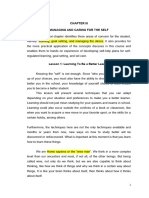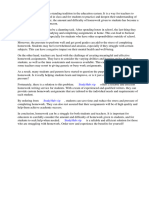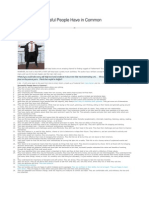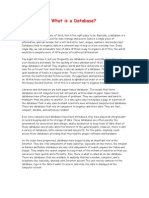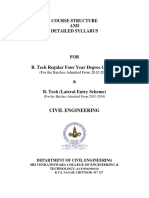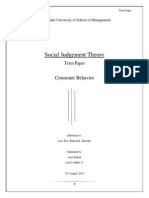Exams Dstress and You
Exams Dstress and You
Uploaded by
Pamela WilliamsCopyright:
Available Formats
Exams Dstress and You
Exams Dstress and You
Uploaded by
Pamela WilliamsOriginal Description:
Original Title
Copyright
Available Formats
Share this document
Did you find this document useful?
Is this content inappropriate?
Copyright:
Available Formats
Exams Dstress and You
Exams Dstress and You
Uploaded by
Pamela WilliamsCopyright:
Available Formats
Exams, Stress and You!
Limiting your stress Further Reading
by Robert Wickenden, Counsellor, Macquarie University Counselling Service It's that time again! Exams looming, essays or prac reports outstanding and you wonder where the year's gone already. You start wondering how you're going to cope with it all. Fear and anxiety are insidious things and they can take hold if you don't do something about them. This amounts to a bad type of stress which is just what you don't need, especially at this time of year. This is not to say that all anxiety is bad, however. A limited amount of anxiety can help you to be more motivated and more purposeful. It can help you to plan your work and to think more clearly and logically about it. In other words, it can help you stay on top of things. [Back to top]
So how can you limit your stress and stay in control?
There are a number of practical things you can do, even at this late stage before the exams. Don't give up hope, even if you start to feel "snowballed" when you think of the all the work you have to do. First of all, it's essential to get yourself organised. Sit down at your desk and make a start on writing down all the things you have to do to prepare for the exams. If you feel there's too much to do, then work out priorities for your work. Outstanding assignments should take priority but make sure to leave time for revision of your lecture notes. The Counselling Service can give you a study planner to help you get organised. Once you make a start on this you'll begin to feel more in control. Here are some further useful tips: 1. Set yourself realistic day-to-day goals in your study. Work on one thing at a time and follow it through to completion, for example, if you're writing an essay. Then put it behind you and move on to the next task. 2. Try to have an idea of the areas that are likely to be covered in your exams. If there is anything you need to have clarified about exam content, make sure to talk with your lecturer or tutor. 3. Give yourself credit for the work you're getting done. You're showing yourself that you can do it! Even small steps forward in your work are worthwhile. 4. Don't allow yourself to slip into self-defeating habits, such as procrastinating. Try to keep a momentum going in your study. Punctuate blocks of study with short breaks to limit fatigue. If you study solidly for a couple of hours, make sure you give yourself fifteen minutes or so before you start up again. Think positively about yourself and your situation. Challenge the negative thoughts that creep into your mind and cause you unnecessary stress at times, such as "I'm going to fail", "I'll end up blowing my future, my chance of getting a career". You don't have any need to think catastrophically, it's not achieving
5.
6.
7. 8.
anything. In fact, it's doing you a lot more harm than good, because it's distracting you away from what you need to do. Learn to become more relaxed in your daily life. There are simple techniques, such as breathing exercises and progressive muscular relaxation exercises, as well as guided imagery, which can help you to feel calmer, and more focused. The Macquarie University Counsellors can help you with these techniques. Some do relaxation tapes for students. (You need to supply the tape). If you would like more information about relaxation techniques, talk with one of the Counsellors. Make sure that your lifestyle is healthy and conducive to effective study. Remember, that it's all too easy to neglect the basics when you're busy and pre-occupied with exams. o Eat regular nutritious meals, including fruit and vegetables. o Try to maintain a good sleep routine, going to bed at the same time each night. Factor some exercise into your routine each day. (Walking is good) o Cut down on caffeine and alcohol and other drugs. o Practice a relaxation exercise at least once a day. Also, think of other things that might help you to relax. Macquarie University Sports Association (MUSA) runs courses each semester in things like Yoga, Meditation, Tai Chi and Massage, all of which can promote a feeling of calmness and relaxation. o Each morning when you get up, try to have a plan for the day. (Make sure it's realistic, especially in terms of your available time). It helps a lot if you can approach the start of each day in a positive way. Make the most of the times when you feel you are at your mental best. Some people study best in the morning, some are more effective at night. Do what you can to avoid unnecessary distraction or interruptions to your work. If you still feel that you are more stressed than you should be, after trying these strategies, then think about making an appointment to have a talk with one of the Counsellors on campus. They know all about the problems that students face at exam time and are happy to help! Also, as a Macquarie University student, you have access to the Study Skills Program that the Counselling Service runs over a number of weeks from the beginning of each semester.
Motivation - and some thoughts on how to find it
Further Reading by Robert Wickenden, Counsellor, Macquarie University Counselling Service Motivation can seem like a scarce commodity for many students at times and this can be especially true in the lead up to examinations. Without it though, your chances of getting the grades you want are likely to suffer. So what is this thing called motivation that for so many people is so hard to find? Well, we can think of motivation as an inducement, or, as an incentive, something that leads us to act in a certain way to achieve a goal, to get what we want. So, it is
associated with a perceived need or want, having a certain energy level and with purposeful (i.e. goal-directed) action. If you feel cold, you should be motivated to put on some warm clothes (or turn on the heater). If you're hungry, you should be motivated to eat. So far, so good. Similarly, if you've got exams coming up, or an essay due, you should be motivated to study. O.K. I hear what you're saying, "but it just doesn't work like that for me with study. I know the work is there.. I know I have to do it.. but I just can't do it I can't get started". O.K. this is the part where a bit of serious critical thinking needs to rear its ugly head! If you've stuck with me so far, I know you're serious about this and will indulge me while I begin to challenge one or two of those basic beliefs that may seem to hold you in such a vice-like grip at times. Alright, I'll try to be gentle here . WHERE is the evidence for believing you can't do it, you just can't get started? So it may be a struggle, but you can make a start. Making a start is often the hardest part. To do so, you will need to do something about the way you are thinking (otherwise, your negative thoughts about yourself may make you become prone to feeling depressed) and you will need to get yourself organised. Consider this scenario: the end of semester and mid-year exams are looming, like some ominous black cloud, just a few weeks ahead. You've recently had a uni break but things didn't quite go according to plan and you haven't started that big assignment yet.. and "oh, no! (shock, horror!).. it can't really be due in three days time, can it? Oh, yeah.. there's another one due in .. what! ONE week?! Not to mention, my tutorial presentation for next week. Why is my life always so chaotic? Why does this happen to me? I can't handle all this." (Exit motivation, enter helplessness/ hopelessness/despair). No use now lamenting loss of time for work during the break. Rather, tell yourself "the work is there and it is inevitable that I will do it!" What's needed now is energy and purposeful action, otherwise you will procrastinate and things will just seem to get worse. You will certainly want to avoid that! What you have to do now is to attack that chaotic snowball of fear, anxiety and negative self-talk. You have to turn your lethargy into action. So, you have to break down your tasks into manageable bits...this is critical. THEN you can begin to prioritise those bits, in terms of the most pressing things ahead of you. THEN you can make a start on them, one by one, completing each task before moving on to the next. Making a start can help you to feel some momentum developing in your work. It will help you to feel more confident about yourself. "But", you say, "how can I do that major assignment in just THREE days?" Well, you probably can't do it very well in that time, BUT you can go to your lecturer, tell him/her you're a bit behind with your work, let him/her know that you take your work seriously and see if you can be given an extension. That way, at least you may have a little more room to breathe. Above all though, you need to approach things logically and strategically and commit yourself absolutely to getting the work done. A few more things to consider to stoke up your motivation: You have the ability to undertake tertiary study. You are an intelligent person. If not, you wouldn't have been accepted into University.
You may well have achieved some reasonable grades in your studies to date. If so, you can repeat that success. Think of what you've done right in the past. Think of 'S M A R T' goals in the way you plan your work, "Specific, Measurable, Achievable, Realistic, Timely" and use these on a daily basis, a weekly basis and until the end of semester in dealing with your work. If you don't understand part of your academic work, talk with your tutor or lecturer about it. Give yourself credit for the progress you make each day, each week, whether studying for exams or writing an essay. Remember, progress consists of consecutive steps (including small ones) in a given direction. Plan your direction, your steps and develop a momentum in your work. Give yourself affirmations ("I have the intelligence and the ability to do this work!") and positive self-talk ("It is inevitable that I will do this work!"). Try to reject those insidious negative thoughts and negative selfassessments, when they come into your head. Plan some reward(s) for your hard work at the end of semester, perhaps a holiday, perhaps a big night out with friends or buy yourself something nice, if finances permit. You will have deserved it! Think of the 'pay-offs' in getting your degree, basking in your feelings of success(!), better opportunities for the future. Visualise yourself on Graduation Day with family/friends. You are working towards that day, you are working towards that future. Make a start, now!
You might also like
- Stroke Recovery Momentum Workbook 2Document23 pagesStroke Recovery Momentum Workbook 2Rafael Taminato100% (1)
- Unit 02 - A Stitch in Time Saves NineDocument17 pagesUnit 02 - A Stitch in Time Saves Ninerajeshmohanan333No ratings yet
- UNDERSTANDING-THE-SELF-MODULEy IDocument41 pagesUNDERSTANDING-THE-SELF-MODULEy Iamirceyden24No ratings yet
- Sa Sowk-625 Single Case Research Study 20180117Document3 pagesSa Sowk-625 Single Case Research Study 20180117api-405320544No ratings yet
- Acts Questions & AnswersDocument8 pagesActs Questions & AnswersPamela Williams100% (1)
- Research Methods in The Behavioral ScienceDocument3 pagesResearch Methods in The Behavioral ScienceJB100% (1)
- sp2079 Elements of Social and Applied Psychology - Examiner CommentsDocument33 pagessp2079 Elements of Social and Applied Psychology - Examiner CommentsSyeda Amina AliNo ratings yet
- Workplace Wellbeing: Question BankDocument23 pagesWorkplace Wellbeing: Question BankNainika SukhwaniNo ratings yet
- Administrative Law SyllabusDocument14 pagesAdministrative Law SyllabusKarl Lenin BenignoNo ratings yet
- Writing Personal Statements For Graduate School: Pat Sokolove, PHDDocument26 pagesWriting Personal Statements For Graduate School: Pat Sokolove, PHDAlAr-JohnTienzoTimeniaNo ratings yet
- Time Management and Focus - Learn to Master Time for Greater SuccessFrom EverandTime Management and Focus - Learn to Master Time for Greater SuccessNo ratings yet
- Welcom To Science 20Document13 pagesWelcom To Science 20api-207957230No ratings yet
- I'm Supposed To Supervise These PeopleDocument135 pagesI'm Supposed To Supervise These PeopleAmanda NorrisNo ratings yet
- Internship Final ReportDocument7 pagesInternship Final Reportapi-539845616No ratings yet
- Stem Projectbased Learning 2013 (011 050)Document40 pagesStem Projectbased Learning 2013 (011 050)Dian Pertiwi RasmiNo ratings yet
- Committee Chairman's Name Name of ProjectDocument32 pagesCommittee Chairman's Name Name of ProjectDianne BishopNo ratings yet
- Holt Decisions For Health Level Green PPT Chapter 1Document17 pagesHolt Decisions For Health Level Green PPT Chapter 1Loire Aviles Collamat100% (1)
- Operations Management Course OutlineDocument3 pagesOperations Management Course OutlineIqra GorsiNo ratings yet
- (VCE Methods) 2012-16 TSSM Unit 34 Exam 1 Solutions PDFDocument5 pages(VCE Methods) 2012-16 TSSM Unit 34 Exam 1 Solutions PDFmichael scottNo ratings yet
- Good Ways To Motivate Yourself To Do HomeworkDocument7 pagesGood Ways To Motivate Yourself To Do Homeworkvdlpjpapd100% (1)
- MASTER YOUR MOTIVATION: Unleash Your Inner Drive and Achieve Extraordinary Results (2023 Beginner Guide)From EverandMASTER YOUR MOTIVATION: Unleash Your Inner Drive and Achieve Extraordinary Results (2023 Beginner Guide)No ratings yet
- Summary Active Recall PDFDocument6 pagesSummary Active Recall PDFgulla692008No ratings yet
- To Tell The Chronic Procrastinator To Just Do It Would Be Like Saying To A Clinically Depressed Person, Cheer UpDocument4 pagesTo Tell The Chronic Procrastinator To Just Do It Would Be Like Saying To A Clinically Depressed Person, Cheer UpAbhishekNo ratings yet
- Surviving Failure: Cover FeatureDocument5 pagesSurviving Failure: Cover FeatureNitesh ChatrabandNo ratings yet
- Capstone Draft ProposalDocument8 pagesCapstone Draft Proposalapi-675857697No ratings yet
- Academic Success Coaching Program: ToolkitDocument24 pagesAcademic Success Coaching Program: ToolkitKarla HyltonNo ratings yet
- GE WorkOutDocument5 pagesGE WorkOutKok Chek0% (1)
- Giving Homework To StudentsDocument8 pagesGiving Homework To Studentslip0lomyjof3100% (1)
- Brainstorming Tips For Better Time ManagementDocument4 pagesBrainstorming Tips For Better Time Managementibrahim sajjad100% (1)
- Be More Productive: Eliminate Procrastination, Skyrocket Your Productivity, Boost Confidence & Become a Better YouFrom EverandBe More Productive: Eliminate Procrastination, Skyrocket Your Productivity, Boost Confidence & Become a Better YouNo ratings yet
- Mental Fitness Workbook 2024 MasterDocument291 pagesMental Fitness Workbook 2024 MasterJames AslanianNo ratings yet
- Time Management: Pros & Cons: Presentation by Yulia ShvydkaDocument16 pagesTime Management: Pros & Cons: Presentation by Yulia ShvydkaЮлія ШвидкаNo ratings yet
- Workstyle-Lifestyle PreviewDocument13 pagesWorkstyle-Lifestyle PreviewldragomanNo ratings yet
- Career Planning JournalDocument27 pagesCareer Planning JournalNeeta RautelaNo ratings yet
- 5 Psychological Theories of Motivation To Increase ProductivityDocument6 pages5 Psychological Theories of Motivation To Increase ProductivityAnonymous Zl6wZZDkMNo ratings yet
- Homework Live DKDocument7 pagesHomework Live DKnyvem0domuj3100% (1)
- PPT Job InterviewDocument10 pagesPPT Job InterviewFacri HarisNo ratings yet
- How Stress Affects High School StudentsDocument9 pagesHow Stress Affects High School Studentsapi-509657705No ratings yet
- Time ManagementDocument5 pagesTime ManagementOana ChelariuNo ratings yet
- Critical Thinking Case AnalysisDocument9 pagesCritical Thinking Case AnalysisJerico PagulongNo ratings yet
- Preventing Employee BurnoutDocument6 pagesPreventing Employee BurnoutAnshumali SaxenaNo ratings yet
- Interview Q & A: The Elevator QuestionDocument17 pagesInterview Q & A: The Elevator QuestionAlberto BrulNo ratings yet
- 50 Traits of Successful PeopleDocument2 pages50 Traits of Successful PeopleAdrian SuciuNo ratings yet
- Reasons Why Schools Should Not Have HomeworkDocument8 pagesReasons Why Schools Should Not Have Homeworkixkkgwhlf100% (1)
- The Ice Breaker: ProjectDocument4 pagesThe Ice Breaker: ProjectgwilkieNo ratings yet
- How To Have A Good DayDocument13 pagesHow To Have A Good DayNemuel KesslerNo ratings yet
- Team Work Is Dream WorkDocument15 pagesTeam Work Is Dream WorkpkNo ratings yet
- Make The Most of Your Reading TestDocument6 pagesMake The Most of Your Reading TestJan RahlNo ratings yet
- Summer Internship JournalDocument4 pagesSummer Internship Journalapi-502768121No ratings yet
- Manage Your Time, Manage Your Life...Purposefully: Time Management 101From EverandManage Your Time, Manage Your Life...Purposefully: Time Management 101No ratings yet
- Motivation Mojo: Awakening The Limitless Drive WithinFrom EverandMotivation Mojo: Awakening The Limitless Drive WithinNo ratings yet
- Peak Productivity: How To Triple Your Productivity And Achieve Your Personal BestFrom EverandPeak Productivity: How To Triple Your Productivity And Achieve Your Personal BestNo ratings yet
- Self-Discipline: Boost Self-Confidence, Overcome Procrastination, Stay Motivated & Live Your DreamsFrom EverandSelf-Discipline: Boost Self-Confidence, Overcome Procrastination, Stay Motivated & Live Your DreamsNo ratings yet
- Exit Interview QuestionsDocument3 pagesExit Interview Questionsapi-371785797No ratings yet
- My De-Procrastination Plan: GOAL: Complete Work in Given Timeframe So That I Can Relax and Spend Quality Time WithDocument1 pageMy De-Procrastination Plan: GOAL: Complete Work in Given Timeframe So That I Can Relax and Spend Quality Time Withkrystal_royceNo ratings yet
- Maintaining A Positive AttitudeDocument16 pagesMaintaining A Positive AttitudeJoshua Torres IINo ratings yet
- Top 10 Tips - Hack My StudyDocument5 pagesTop 10 Tips - Hack My StudyKah WaiNo ratings yet
- Procrastination: A Scientific Guide On How To Stop ProcrastinatingDocument6 pagesProcrastination: A Scientific Guide On How To Stop ProcrastinatingsunilNo ratings yet
- Parenting & Paradox of Balance Exercise - KDKADocument4 pagesParenting & Paradox of Balance Exercise - KDKAHeather LangNo ratings yet
- Does Homework Build ResponsibilityDocument5 pagesDoes Homework Build Responsibilityrefvqstif100% (1)
- 12 Reasons You Can't Focus - and How To Fix It Now: 1. You're Not Getting Enough SleepDocument5 pages12 Reasons You Can't Focus - and How To Fix It Now: 1. You're Not Getting Enough Sleepmaricon elleNo ratings yet
- Overcoming Procrastination: Your Ultimate Guide to Stop Delaying and Start Living Your Best LifeFrom EverandOvercoming Procrastination: Your Ultimate Guide to Stop Delaying and Start Living Your Best LifeNo ratings yet
- Tpa Goal TemplateDocument2 pagesTpa Goal Templateapi-292178149No ratings yet
- Children and Television ViewingDocument8 pagesChildren and Television ViewingPamela WilliamsNo ratings yet
- My Anchor Holds - LyricesDocument1 pageMy Anchor Holds - LyricesPamela WilliamsNo ratings yet
- Case StudyDocument2 pagesCase StudyPamela WilliamsNo ratings yet
- I Am I Am - LyricsDocument1 pageI Am I Am - LyricsPamela WilliamsNo ratings yet
- Northern Caribbean University - Org. BehaviourDocument5 pagesNorthern Caribbean University - Org. BehaviourPamela WilliamsNo ratings yet
- Children and TelevisonDocument11 pagesChildren and TelevisonPamela WilliamsNo ratings yet
- Mannagement Information SystemDocument15 pagesMannagement Information SystemPamela WilliamsNo ratings yet
- Glossary of Trade Union TermsDocument2 pagesGlossary of Trade Union TermsPamela WilliamsNo ratings yet
- COMPUTER APPLICATIONS - Excel NotesDocument2 pagesCOMPUTER APPLICATIONS - Excel NotesPamela WilliamsNo ratings yet
- Cost Accounting - Job CostingDocument6 pagesCost Accounting - Job CostingPamela WilliamsNo ratings yet
- #1 - Mission StatementDocument2 pages#1 - Mission StatementPamela WilliamsNo ratings yet
- Research Paper - RatiosDocument1 pageResearch Paper - RatiosPamela WilliamsNo ratings yet
- #3 - Business MemorandumDocument3 pages#3 - Business MemorandumPamela WilliamsNo ratings yet
- What Is A DatabaseDocument9 pagesWhat Is A DatabasePamela WilliamsNo ratings yet
- My Book Report - COMPLETEDDocument25 pagesMy Book Report - COMPLETEDPamela WilliamsNo ratings yet
- Graduation SpeechDocument4 pagesGraduation SpeechPamela WilliamsNo ratings yet
- Hurricane Tips: Here Are Some Helpful Tips To Get You Ready This Hurricane SeasonDocument5 pagesHurricane Tips: Here Are Some Helpful Tips To Get You Ready This Hurricane SeasonPamela WilliamsNo ratings yet
- The Cross and It's MeaningDocument9 pagesThe Cross and It's MeaningPamela WilliamsNo ratings yet
- Hurricanes: Pledge To PrepareDocument1 pageHurricanes: Pledge To PreparePamela WilliamsNo ratings yet
- B.Tech Civil Syllabus1Document135 pagesB.Tech Civil Syllabus1lokeshNo ratings yet
- IELTS Test Process 20110809Document1 pageIELTS Test Process 20110809ZaitunJaafarNo ratings yet
- Plastic Injection Moulding Dies - Mechanical Engg. (ME) Summer Industrial Training Project ReportDocument58 pagesPlastic Injection Moulding Dies - Mechanical Engg. (ME) Summer Industrial Training Project ReportVinnie Singh50% (2)
- Eng. 102 Writing Project #4 - Researched Argument Essay: PurposeDocument2 pagesEng. 102 Writing Project #4 - Researched Argument Essay: PurposeAnonymous egT9XnNo ratings yet
- Luna Colleges, Inc.: The Impact of Review Centers On The College Examinee'S ConfidenceDocument26 pagesLuna Colleges, Inc.: The Impact of Review Centers On The College Examinee'S ConfidenceApril Abril SalvadorNo ratings yet
- The Mini Mental State Examination MMSE FactsheetDocument5 pagesThe Mini Mental State Examination MMSE FactsheetAde Sofyan0% (1)
- 5 Contoh Pengumuman Sekolah Dalam Bahasa InggrisDocument4 pages5 Contoh Pengumuman Sekolah Dalam Bahasa InggrisPutri PradnyaniNo ratings yet
- Disciplined Agile Scrum Master (DASM) : Examination Content OutlineDocument12 pagesDisciplined Agile Scrum Master (DASM) : Examination Content Outline薛鹏No ratings yet
- Feasibility ReportDocument22 pagesFeasibility Reportj.d. corNo ratings yet
- Format For The Thesis ProposalDocument4 pagesFormat For The Thesis ProposalPrincess Garcia RamosNo ratings yet
- 06 Dcio Ib Eng e Acn TT AnDocument7 pages06 Dcio Ib Eng e Acn TT Anpritesh300100% (1)
- Paket B Listening Ujian Sekolah Bahasa Inggris SMK Tahun Pelajaran 2022-2023Document3 pagesPaket B Listening Ujian Sekolah Bahasa Inggris SMK Tahun Pelajaran 2022-2023Nadiah PutriNo ratings yet
- Govt College of Science Wahdat Road Lahore Dept of Stats-Bs 4 Years Program (Stats)Document1 pageGovt College of Science Wahdat Road Lahore Dept of Stats-Bs 4 Years Program (Stats)fazalulbasit9796No ratings yet
- 50 DraftsDocument6 pages50 DraftsgiophilipNo ratings yet
- PINNACLE - Two Year Integrated School Program For JEE (Main & Advanced), 2023Document6 pagesPINNACLE - Two Year Integrated School Program For JEE (Main & Advanced), 2023Kirtan KumarNo ratings yet
- Companies Recruiting Through GATE ScoreDocument6 pagesCompanies Recruiting Through GATE ScoreRanvir RanaNo ratings yet
- Interior Design Licensure Examination PDFDocument2 pagesInterior Design Licensure Examination PDFAileen BobadillaNo ratings yet
- Social Judgement Theory - Term PaperDocument8 pagesSocial Judgement Theory - Term PaperAmit PathakNo ratings yet
- South Asian Association For Regional Cooperation (SAARC) Saarc Energy Centre (Sec)Document9 pagesSouth Asian Association For Regional Cooperation (SAARC) Saarc Energy Centre (Sec)RanaAshiqERasoolNo ratings yet
- NSTP 2 Authentic Assessment and Performance Task in LiteracyDocument11 pagesNSTP 2 Authentic Assessment and Performance Task in LiteracyMyeth BendalNo ratings yet
- Annotated Bibliography D3Document3 pagesAnnotated Bibliography D3Sam WilmerNo ratings yet
- CFEExam Prep CourseDocument28 pagesCFEExam Prep Courseb351895No ratings yet
- The Effects of Listening To Music During QuizzesDocument19 pagesThe Effects of Listening To Music During QuizzesCaryll Mae MagnoNo ratings yet
- Why Do You Want To Join MBADocument3 pagesWhy Do You Want To Join MBApaalu14No ratings yet
- Fac 4862Document15 pagesFac 4862richelle.govNo ratings yet
- Sbam-Tos-001 NewDocument1 pageSbam-Tos-001 NewHanis MeeNo ratings yet


